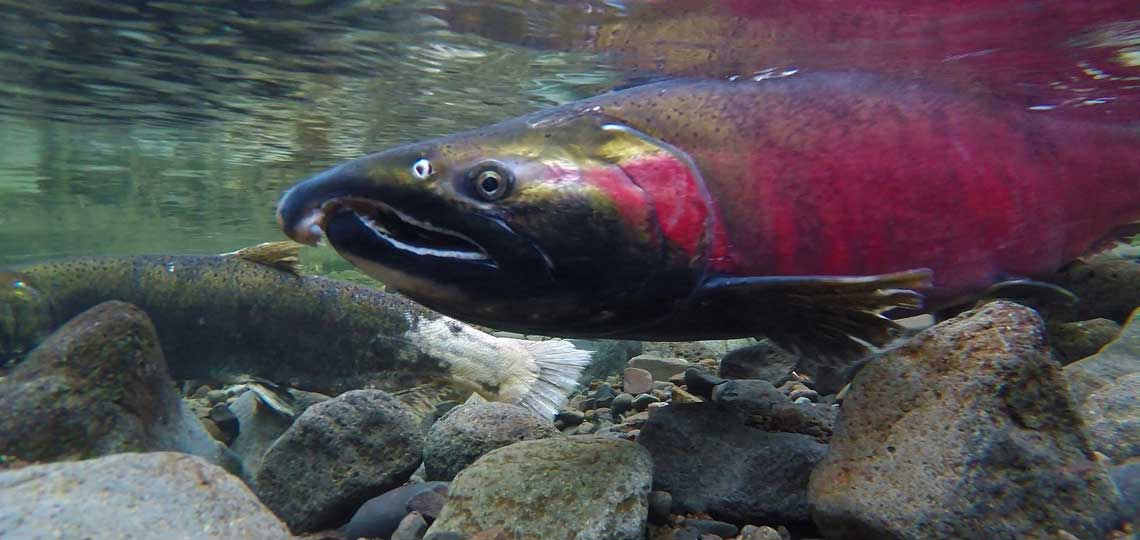In the past year, we have seen mounting evidence that a deadly disease known as heart and skeletal muscle inflammation (HSMI) is threatening salmon off the coast of British Columbia.
The latest proof is from a recently-released report by a group of Norwegian scientists. This report confirmed a cause and effect relationship between piscine reovirus (PRV), which is widespread in British Columbia farmed salmon, and HSMI.
These findings stress the need to take precautions to limit the spread of PRV and HSMI when transferring salmon to and between open-net fish farms.
In September 2016, we launched a case on behalf of independent biologist Alexandra Morton, arguing that Dominic LeBlanc, Canada’s Minister of Fisheries and Oceans, has been acting illegally by issuing licenses to transfer farmed salmon without first testing for PRV.
Our case with Alex centers on section 56 of the Fishery (General) Regulations, which says that the Minister may only issue a licence to release or transfer fish if they “do not have any disease or disease agent that may be harmful to the protection and conservation of fish.”
But now, it appears that the Department of Fisheries and Oceans (DFO) is trying to change the rules.
In a notice of intent posted online, the DFO signaled its plans to amend regulations for transferring live fish, including salmon.
While it is unclear is what form these changes will take, the language in the notice gives us cause for concern.
Currently, the announcement says, the DFO works with provinces and territories to manage risks associated with moving salmon from one place to another. These risks include diseases.
Since 2010, however, the department has been shifting responsibility for fish health to the Canadian Food Inspection Agency.
According to the notice of intent, this has resulted in “program overlap,” which the DFO proposes to address by amending section 56 of the Fishery (General) Regulations, the same section of the regulations upon which our entire case with Alex rests.
Our concern is that these amendments, made under the guise of reducing overlap, will only serve to redirect responsibility to protect wild salmon from disease from the Minister to the food inspection agency.
This would not only put the future of our case into question; it would also raise the broader issue of whether Ministers should be able to shirk their responsibilities by passing them onto other agencies.
This is not the first time that the DFO has tried to sidestep its responsibility to protect wild salmon.
Back in 2015, we helped Alex secure another victory when the Federal Court struck down licence conditions that allowed the government to pass decision-making powers onto private aquaculture companies.
In that case, the judge ruled that these conditions violated section 56 of the Fishery (General) Regulations, the same section that the government now intends to amend.
The 2015 ruling was important because it made it clear that this law requires the Minister to use a precautionary approach to managing fish farms. This means that the Minister cannot use lack of scientific certainty as an excuse to put off taking action to prevent harm to the environment.
On the ground, this means that Minister must take action to prevent the spread of diseases when transferring farmed salmon– even when the science is not definitive.
Now that the government has announced its intent to change section 56, our position is clear: The Minister has a court-recognized duty to protect wild salmon and this should include keeping them safe from harmful diseases. The Minister should not be allowed to offload this onto the Canadian Food Inspection Agency.
Looking ahead, we hope that our initial fears about amendments to the Fishery (General) Regulations are never realized.
In an ideal world, any future amendments that are made to the regulations would be guided by the precautionary principle, and would reinforce the Minister’s duty to protect wild salmon from harmful diseases like HSMI.
Weighing in on amendments to fishery regulations
Alongside its letter of intent, the government also launched a public consultation period, which wraps up on Nov. 23.
Tell the government that you expect any amendments to the Fishery (General) Regulations will draw on the precautionary principle and align with the Minister’s duty to protect wild salmon from harmful diseases by sending an email, writing a letter, or contacting your local MP.
You can also tweet at Minister LeBlanc to let him know that you expect him to do his part to #SaveOurSalmon, or call his office at 613 993 0999.




